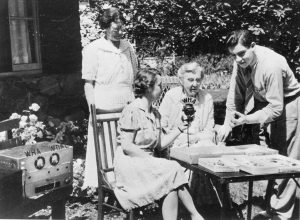UW-Madison Archives Receives CLIR Award to Digitize 250 At-Risk Recordings
(2/19/2021) UPDATE**
Cat Phan was featured on the Wisconsin Public Radio’s The Morning Show this week (Feb 16th) talking about the CLIR-funded project “WHA Radio Broadcasts: Early Years of Public Radio.”
The program is available online here.
—
The University of Wisconsin-Madison Archives was one of just 20 institutions across the country recently awarded a Recordings at Risk grant from the Council on Library and Information Resources (CLIR). The Archives will use the grant to support the project Preserving Rural and Women’s Programming on Wisconsin Public Radio (WHA), which involves digitizing 250 transcription discs, dating between 1920 and 1950.
“We are extremely excited and grateful to CLIR and the Mellon Foundation for providing this generous funding that will allow us to take important steps in preserving our incredible collection of early WHA/Wisconsin Public Radio broadcasts,” said Cat Phan, Digital and Media Archivist at UW-Madison. “In addition to preservation, another driving factor for us is access,” added David Pavelich, Director of Special Collections and Archives. “These recordings can’t safely be heard without this digitization process, and what we want more than anything is for this programming to be heard once again, freely and by anyone with access to the internet.”

The discs UW-Madison will focus on documenting have programming from WHA, which aired its first broadcast in 1917, making it the oldest public radio station and one of the oldest continuously broadcasting radio stations in the United States. Originating from the University’s physics department, WHA radio was an early exemplar of the Wisconsin Idea, producing educational programming that sought to educate, inform, and inspire residents across the state.
“Our project will primarily focus on WHA’s The Farm Program—weather and market reports combined with expertise shared by faculty and staff of the Agricultural College. It will also focus on The Homemakers Program—homemaking, self-development, and community service information aimed at women,” explained Phan. “Both programs created communities from previously isolated residents united through a shared listening experience and were wildly successful.”
One 1941 survey estimated that The Farm Program had regular listeners in 65 of 71 Wisconsin counties and Aline Hazard, the primary host of The Homemakers Program, received more than ten thousand letters a year from fans.
These sound recordings of the earliest WHA programming only exist on transcription discs, which are inherently fragile and unstable. They are susceptible to degradation, require expertise to handle, and need specialized equipment. Digitization is the best means of preserving the content on these discs. The Archives selected 250-disc samples from the collection to pilot a digitization workflow with the hopes of utilizing the process for future digitization for the remainder of the collection.

Additionally, the Archives, which currently holds 7,000 transcriptions discs, will digitize 4-H programs and 100 discs of Wisconsin Yarns, a program that dramatized Wisconsin folklore.
CLIR awarded a total of $573,416 for Recordings at Risk to projects across the country. The Preserving Rural and Women’s Programming on WHA project is one of 20, out of 77 submissions, supported by the Digitizing Hidden Collections or Recordings at Risk grant from CLIR. The grant program is made possible by funding from The Andrew W. Mellon Foundation and supports the preservation of rare and unique audio and audiovisual content of high scholarly value. CLIR will award a total of $2.2 million between May 2019 and April 2021.
CLIR is an independent, nonprofit organization that forges strategies to enhance research, teaching, and learning environments in collaboration with libraries, cultural institutions, and communities of higher learning. To learn more, visit www.clir.org and follow them on Facebook and Twitter.